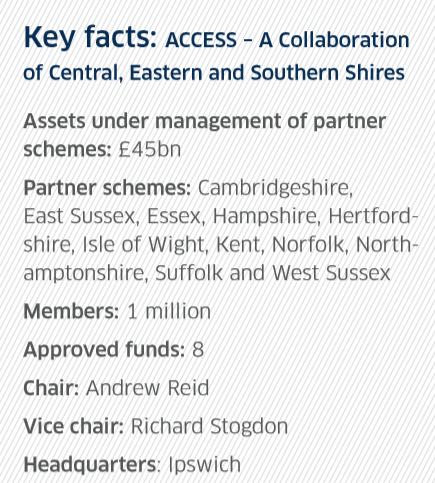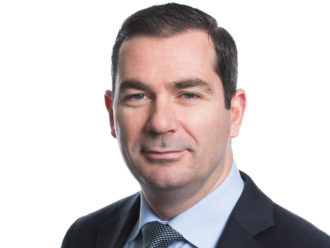ACCESS chair Andrew Reid tells Mark Dunne about setting up the LGPS pool, global equities, picking fund managers, the importance of ESG and the trouble with some alternatives.
How is the pooling process progressing for you?
We are well on the way. We have been working out what structure we wanted to alight upon and it is all the better for taking our time to consider alternative structures. We have been consistent all the way through the process to maintain our core objectives, which are to ensure that there is a clear democratic link all the way through to our fund members, because we are conscious of the need to exercise our fiduciary responsibility, and maximise risk-adjusted returns. Making sure that we get value for money for our members is why we exist.
ACCESS’ 11 individual funds are governed by a joint committee and there is a legal agreement to affect our requirements to pool. So there is no separate corporate entity with a shareholding structure. #
It is purely 11 individual funds that have clubbed together with an authority agreement that binds us together.
How much of the £45bn of assets owned by the 11 funds been pooled so far?
The first piece we did was back in early 2018, which was to set up a procurement exercise for the management of our passive funds. UBS won that process. That was about £11bn, which at the time was around 25% of our total funds under management. It was a good start.
Since then we have appointed Link Financial Solutions as our operator, which happened last spring. Our first sub-fund was approved in the autumn.
We had another seven sub-funds approval by the Financial Conduct Authority (FCA) by the end of last year.
In terms of where we expect to be, about two-thirds will be pooled by the late spring/early summer this year. The focus has been on liquid assets, in terms of global and UK equities as well as fixed income.
Our target is to have between 80% and 85% of the assets pooled by the spring of 2021. It is very much where we expect to be and we hope to pool about 90% of our total.
There are, of course, going to be things that are sticky. Some of the alternatives that the individual funds hold may never be pooled. They will run-off in time.
Some of the alternatives that the individual funds hold may never be pooled.
With Link on board will you have any involvement in deciding who manages ACCESS’ assets?
Link appoints individual managers. It has a prescribed method and system for vetting managers and making sure that they conform in every respect from a regulatory point of view and from a governance perspective. That is a key role that it performs on our behalf.
What they are doing is discussing with us those funds that pass the initial tests. They seek our opinion as to how we feel about those particular managers. That is an informal process and it has worked well so far. There is a good dialogue between us. They seek to understand and appreciate our overall asset allocation and then look at individual managers within that, but they are the appointers in each case, apart from anything that goes through an open procurement process, which is out of their hands as well as, to a certain extent, out of our hands too.
Why was global equities chosen as ACCESS’ first fund?
It was the easiest one to adopt. There was no particular reason why it was global equities verses UK equities. It was the one that we alighted upon early on.
We did this on a pilot basis. In other words, we wanted to test the approach with Link, and vice versa. Rather than throw a whole smattering of potential sub-funds in, we thought we would try and get it right first time. It just happened to be global equities that presented itself.
We do not seek to restrict our managers in any way in terms of their holdings, but we do seek for them to engage on ESG issues.
What is the strategy in your global equities fund?
What is important is to look at how ACCESS is set up. As a pool we are in-effect a facilitator. If you look across the board of individual pension funds for the individual authorities, you will find a myriad of different approaches in terms of investing in equities – global, UK or a specific regional focus – or any aspect of fixed income. We are not restricting what the individual funds invest in.
Currently, we have more than 75 managers, which we will naturally reduce as part of the pooling process. We are facilitating the opportunity for funds to simplify their structures, should they wish, or indeed to further diversify their portfolio.
One of the benefits of pooling is that it allows some of our smaller funds, which might have a more vanilla portfolio of equities and bonds, to think about how they might re-order their asset allocation, because they now have access to economies of scale.
I expect it to work in two ways. It will allow some funds to choose to simplify their portfolio at the edges and focus on more core opportunities. It will also help other funds to increase their diversification.
So if you dig into the portfolios of the individual funds you will find a huge array of different opportunities.
With this particular strategy, are there any particular growth or income targets that you have set your managers?
We will take the opportunity to identify the different strategies that the underlying fund wants to achieve and follow. So it might have a value strategy, a growth strategy or an income strategy. We will then accommodate the majority.
If people do not want to follow a particular strategy they don’t need to, but then, of course, they don’t get any of the benefits that might accrue from a cost-saving perspective.
So there are different strategies, but, again, this is to facilitate the opportunity for funds to participate, if they wish.
How are you dealing with passive funds or alternative assets, such as infrastructure, which are not compatible with your ACS structure?
We expect to be able to pool the vast majority of our assets. Obviously, there are alternatives in each of our books that can be particular to a fund. There are some direct property holdings, which for some people are local.
There are other holdings that are very particular to one fund but not common with others, like Suffolk’s investment in timber, for example.
What we are going through is an exercise in understanding what we all have across the board. We will probably call it ‘illiquids’ for the sake of sweeping in alternatives that might be anything from private equity, total return funds, property, funds of funds and, of course, infrastructure in its broadest definition, whether you wish to include housing or not. We are going through an exercise of collating that information and seeing what the different strategies are.
Currently, what is emerging is that each of us has a different approach. For example, Hampshire had previously appointed a specific global infrastructure manager to build a portfolio for them.
We at Suffolk developed our own approach seeking equitytype returns without the correlation. Others are seeking more of a fixed income-type return.
We are building a picture of what we all have and they will be talking about whether or not there is any benefit in developing a collective approach, or tapping into a collective approach that might already exist, such as the Pensions Infrastructure Platform.
With no compulsion, nothing being set as yet and we don’t plan to just focus on two or three things; it is very much up to individual funds to determine their own asset allocation. We don’t want to be too restrictive.
ESG is a big topic in investment circles. What role does it play in your investment strategy?
It is down to individual funds to determine their own strategy. We are not being prescriptive. It is down to the individual managers to explain their ESG approach to us. I will only talk for my own fund and our policy is to leave it to the manager and to seek engagement with companies from them. We at Suffolk expect them to engage.
We do not seek to restrict our managers in any way in terms of their holdings, but we do seek for them to engage on ESG issues.
Are these engagement discussions focusing on reducing carbon footprints?
We see the general movements for setting a policy for things like your reducing carbon footprint as being part of good business. We expect that to filter through to the performance and returns over the longer term. We are not saying: “Do not do this,” or “do that,” unless there was a compelling reason for that to be the case. We haven’t found one so far.
Our target is to have between 80% and 85% of the assets pooled by the spring of 2021.
Are you collaborating with any other pools on investments?
Sure. There are cross-pool discussions on-going all of the time.
There is a cross-pool infrastructure group that we are part of that. That is important.
We all attended an interesting day that was convened by Rishi Sunak, the minister for housing, communities and local government, in London at the end of 2018.
We were talking about the specifics of infrastructure, globally and in the UK. Lots of good ideas were shared there. Those discussions are continuous and ongoing. It is only right that we should understand what other pools are doing so that we can learn and co-operate on things.
But there is nothing as yet on anything specific like infrastructure that works for us, but then we are at the early stage of understanding and thinking about how we might work going forward on things like illiquids.





